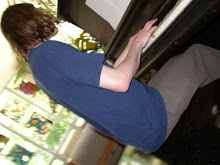I haven't gotten a chance to read Inherent Vice yet, but I have gotten to hear a snippet of Thomas Pynchon reading from his new book and it sounds great. Apparently, the man doesn't want his readers to know what he looks like but is glad to let them hear his voice. Below is the selection from Inherent Voice with Pynchon reading that's up on YouTube, followed by one of his two Simpsons appearances (the other one is the Gravity's Rainbow Cookbook, which I can't find anywhere).
Saturday, August 22, 2009
Sunday, February 22, 2009
Elliott Carter in Conversation
Elliott Carter (with Daniel Barenboim and James Levine) in conversation with Charlie Rose late last year for Carter's birthday. Barenboim and Levine especially do a lovely job of explaining why Carter's music is heads above much "contemporary classical" music of the last few decades.
Tuesday, January 6, 2009
David Shapiro, David Lehman, and Haiku
Over the past few months David Lehman has been putting up haiku-based poems that he and David Shapiro exchanged over the last few years. They've been lovely to see, and I'm constantly amazed by how surprising and breathtaking Shapiro's work is, no matter how often I return to the poems. "Summer Afternoon" provides a wonderful example of what makes Shapiro's work vital in the way he moves toward describing the physical qualities of the day in his first four stanzas:
Stanzas one, three, and four all include that basic structure of a gasp of surprise between line two and and the unexpected shift that occurs in line three--the shift in line three of stanza four particularly appeals to me, where the potential cliche of "blue like bluejays" is transformed by the bluejays' imitation of sky, beautifully complicating the simile whose function is itself a form of imitation.
While this structure of a surprise in line three might become expected just from its strong presence in the first stanza (where no concrete image appears until the surprise itself appears), Shapiro is not simply inventing--which itself might well be enough!--but is moving into a description of phenomenal qualities of the day: the temperature was cool, the air was calm, the sun was bright, and the sky was powerfully blue (presumably no clouds). While an unsympathetic reader might read the lines as purely fanciful, they are, in fact, the opposite of fancy and instead use the tools of a postmodern rhetoric to grasp toward a depiction of the physicality of the surrounding world, grasping line by line toward the world's physicality in a similar to William Carlos Williams or Theodore Roetke.
The poems are filled with exciting moments like these, and David Lehman just put up their first haiku exchange from back in 2003.
First Exchange (Shaprio and Lehman)
"Summer Afternoon" (Shaprio)
"One Plus One" (Lehman)
"L'Shana Tova" (Lehman)
The site also includes a related poem by David Shapiro, "After Ryokan," which writes from the work of the Japanese poet Ryokan.
"After Ryokan"
Today was unbear-
ably beautiful like a
bear walking thru school!
Today was amaz-
ingly cool and calm like fish
rushing to the knife!
today the sun hit
the bricks as if a painter
added more yellow!
today supremely
lucid and blue like bluejays
imitating sky!
Stanzas one, three, and four all include that basic structure of a gasp of surprise between line two and and the unexpected shift that occurs in line three--the shift in line three of stanza four particularly appeals to me, where the potential cliche of "blue like bluejays" is transformed by the bluejays' imitation of sky, beautifully complicating the simile whose function is itself a form of imitation.
While this structure of a surprise in line three might become expected just from its strong presence in the first stanza (where no concrete image appears until the surprise itself appears), Shapiro is not simply inventing--which itself might well be enough!--but is moving into a description of phenomenal qualities of the day: the temperature was cool, the air was calm, the sun was bright, and the sky was powerfully blue (presumably no clouds). While an unsympathetic reader might read the lines as purely fanciful, they are, in fact, the opposite of fancy and instead use the tools of a postmodern rhetoric to grasp toward a depiction of the physicality of the surrounding world, grasping line by line toward the world's physicality in a similar to William Carlos Williams or Theodore Roetke.
The poems are filled with exciting moments like these, and David Lehman just put up their first haiku exchange from back in 2003.
First Exchange (Shaprio and Lehman)
"Summer Afternoon" (Shaprio)
"One Plus One" (Lehman)
"L'Shana Tova" (Lehman)
The site also includes a related poem by David Shapiro, "After Ryokan," which writes from the work of the Japanese poet Ryokan.
"After Ryokan"
Labels:
David Lehman,
David Shapiro,
Haiku,
Poetry,
Ryokan
Subscribe to:
Comments (Atom)
